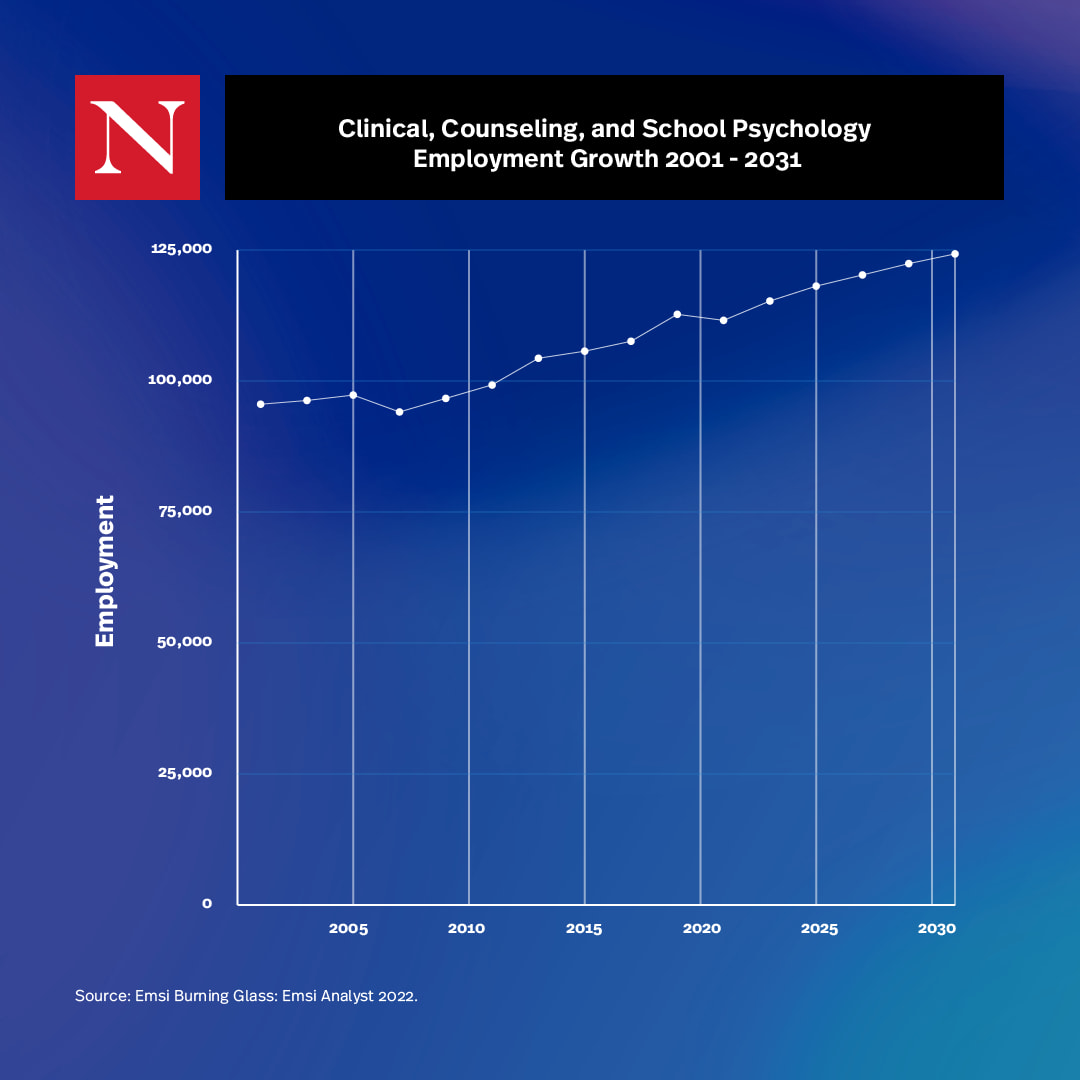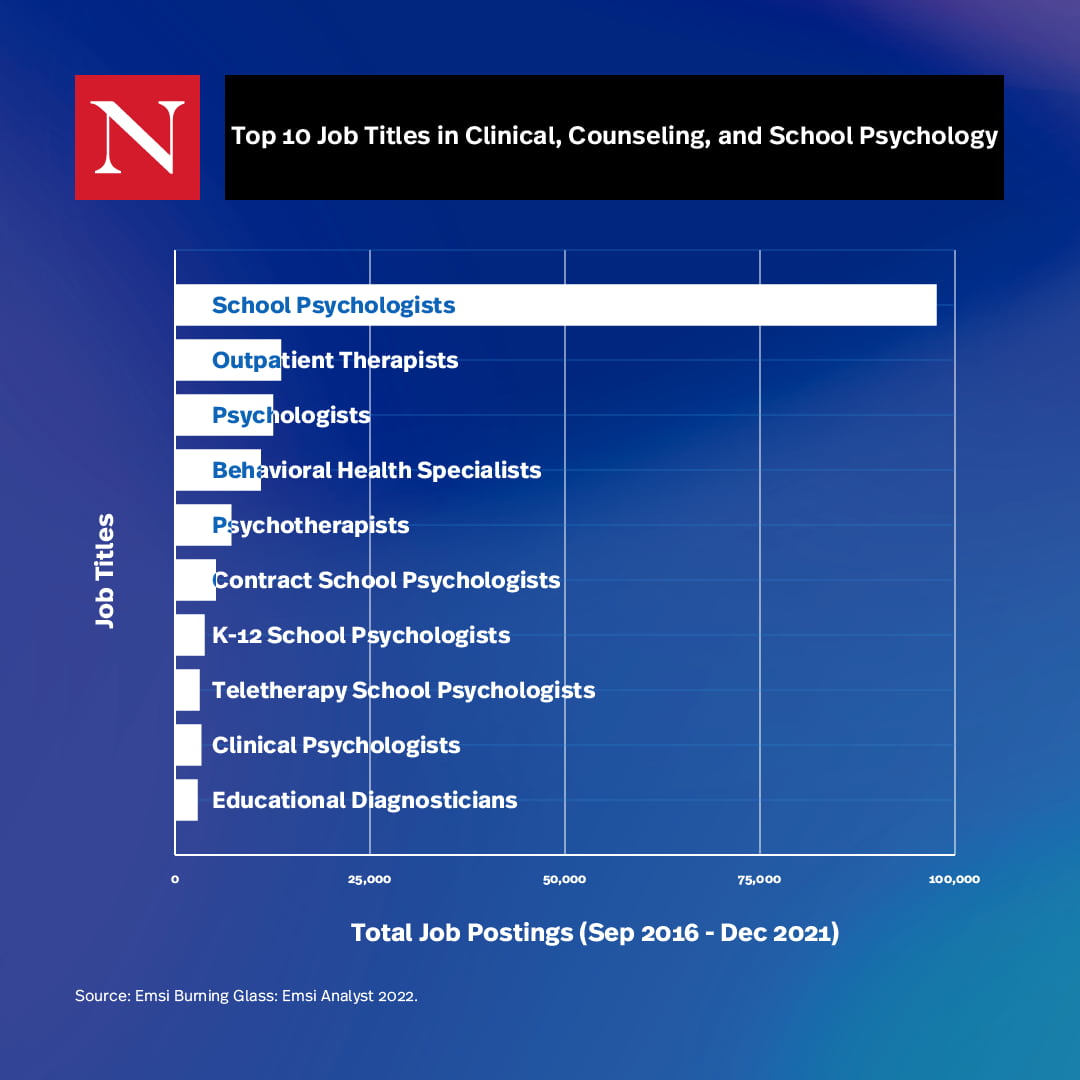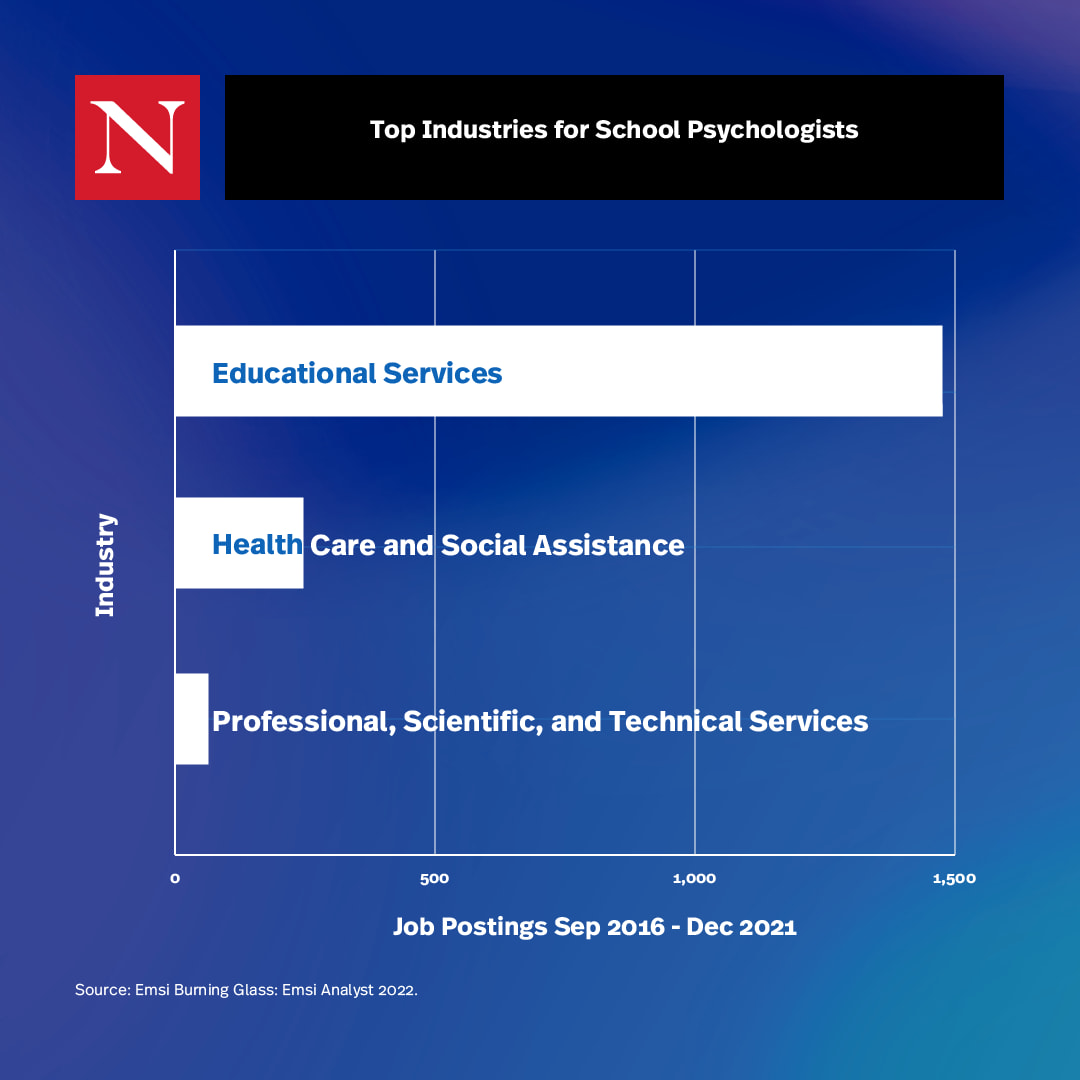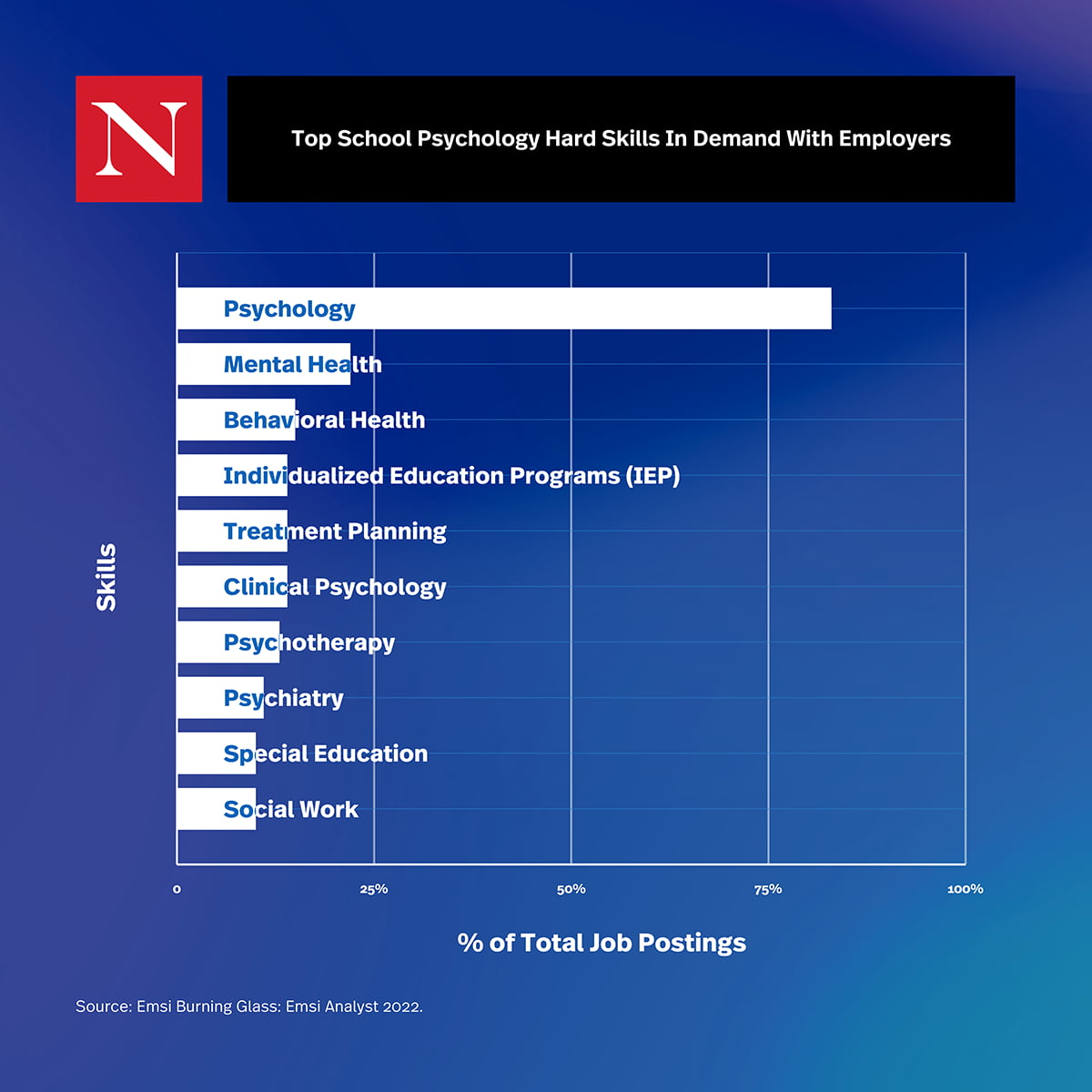School psychology is an exciting and fast growing field. To properly position yourself as a school psychologist, you’ll need to understand the unique educational requirements of this career path. Although school psychologists aren’t required to obtain a doctoral degree, licensure involves more than a typical one- or two-year master’s program.
The good news is that many master’s programs in school psychology provide the educational requirements needed to obtain licensure. Here’s an overview of the jobs you can expect to find with a master’s degree in school psychology.
What is School Psychology?
School psychology is an area of applied psychology in which professionals collaborate with teachers and families to support students’ mental and academic well-being. It’s a rewarding career that’s growing in demand as the need for mental health support in schools increases. The current average growth rate of clinical, counseling, and school psychologist employment is approximately 12 percent.

With this influx of job opportunities, school psychologists shouldn’t expect these positions to look the same across the board. This is because school psychology can’t be put in a box, as no two days are exactly alike.
While responsibilities can differ, one commonality that most school psychologists share is their support of students in one-on-one or group settings. Unlike many other psychology careers which focus on addressing concerns after they have arisen, school psychology emphasizes preventative intervention as well.
School psychologists are typically responsible for the following duties:
- Supporting students’ mental health: School psychologists implement both responsive and preventative interventions on the individual or group level to promote mental well-being in the classroom.
- Encouraging students’ academic success: Academic support is another service school psychologists provide. If a student is struggling to learn how to read, for example, a school psychologist can implement evidence-based reading strategies to help them.
- Conducting assessments: School psychologists assess students’ strengths and weaknesses and are often called to determine whether a child needs special education support.
- Aiding school systems: If a system-wide problem such as bullying exists, school psychologists are often tasked with implementing measures to resolve the issue.
What Can You Do with a Master’s in School Psychology?
A master’s degree alone in school psychology won’t prepare you for very many jobs in the field. To become a certified school psychologist, most states require an MS in School Psychology, plus 30 additional credits in the form of an Educational Specialist (EdS) degree or Certificate of Advanced Graduate Studies (CAGS).
In total, most accredited master’s degree programs take three years to accomplish. This means that prospective school psychologists can find themselves working as a licensed school psychologist within seven years of graduating high school.
Job Titles
Unlike many career paths, the majority of graduates from a school psychology program become school psychologists post-graduation. In fact, many accredited programs such as Northeastern University’s Masters/CAGS in School Psychology, equip students with the experience and credentials they need to move straight into the field following graduation. Therefore, many students receive job offers before they’ve even received their diploma. This can be reassuring to prospective graduates who are eager to start their career as soon as possible.
Years down the road, however, there are additional career options school psychologists can obtain with additional coursework or certificates. While many graduates choose to remain school psychologists for the duration of their career, some pursue advanced job opportunities within the educational sector, or even outside it.
While school psychology isn’t a well-known field of psychology, it’s one of the most in-demand ones. If you’re deciding between clinical, counseling, and school psychology, you may want to consider the top job titles of these three industries.
Here are the most common job titles listed for clinical, counseling, and school psychology:

- School Psychologists
- Outpatient Therapists
- Psychologists
- Behavioral Health Specialists
- Psychotherapists
- Contract School Psychologists
- K-12 School Psychologists
- Teletherapy School Psychologists
- Clinical Psychologists
- Educational Diagnosticians
These career paths each require varying levels of education depending on the route you wish to take, as well as the state you work in. However, most careers in school psychology typically require an accredited Master’s program in school psychology. For this reason, if you’re looking for a career where you’ll be able to find a job easily, school psychology is an excellent choice.
Top Industries
Approximately 81 percent of school psychologists work in public schools. This is mainly due to the increasingly high demand for school psychologists in public education And this demand will only get higher if the current school psychologist shortage continues. Graduates of master’s programs in school psychology typically work in the following industries:

- Educational services
- Health care and social assistance
- Professional, scientific, and technical services
- Public administration
Work Locations
As was previously mentioned, most school psychologists elect to work in a public school setting, giving them access to an extensive pool of students to work with, as well as their families. However, they can also work in other settings. Some of the most common school psychology work settings include:
- Public schools
- Charter schools
- Independent schools
- Multiple locations as consultants
Public schools are required to have school psychologists on hand, which is another reason why most school psychology graduates opt to work in a public education setting. Depending on the size and location of the school, they might work in individual buildings within a school, or with an entire school district.
Populations
Are you considering school psychology because you love working with children?. If yes, it’s crucial to understand that while school psychologists do work with students, they’re also responsible for collaborating with teachers and parents. Here are some of the populations most frequently served by school psychologists.
Children
Most school psychologists work with children between the ages of 3 and 21. This represents the general age range associated with school settings. If you have an affinity for a specific age range, however, there are opportunities to work with the following populations:
- Preschool
- Elementary
- Middle school
- High school
You’re not limited to only one age group, however; there are options to work with all ages as well.
Teachers
One of the lesser-known functions of school psychologists is the support they offer teachers. They’re often called to help teachers with student behavior management in the classroom, or even support teachers experiencing burnout. It’s important for school psychologists to provide an environment that supports the mental and academic well-being of students and teachers alike.
Parents
Since school psychologists work with students, it only makes sense that they also communicate with parents. Interventions to support students’ mental health aren’t as effective if they’re not instituted at home. School psychologists educate parents on mental health practices and help them address behavior management issues with their children. They also interact with parents to obtain information about a student’s history and functioning at home to better inform their therapeutic interventions.
Mental Health Professionals
School psychologists also work with other mental health professionals within the educational setting. For example, school psychologists may collaborate with school counselors or social workers to address a student’s specific needs.
Becoming a School Psychologist
Although school psychology graduates qualify for jobs outside of the education sector, a master’s degree in school psychology prepares you best for a job as a school psychologist. The first step to becoming a school psychologist is to complete a master’s program accredited by the National Association of School Psychologists (NASP). Once complete, it’s time to apply for jobs.
An accredited program will equip you with the various skills needed to obtain a position in the field. Looking at a variety of school psychologist job postings, here’s a list of the most hard skills required for a position in school psychology:

- Psychology
- Mental health
- Behavioral health
- Individualized education programs (IEP)
- Treatment planning
- Clinical psychology
- Psychotherapy
- Psychiatry
- Special education
- Social work
Selecting the Right Program
To get the right skills needed for a career in school psychology, it’s important to look for a master’s and certificate program that’s NASP accredited. While some school psychologists opt for a doctoral degree as well, it’s not a requirement. Since school psychologist requirements vary per state, it’s important to conduct thorough research on qualifications needed in your state.
Most states will require a three-year master’s degree program that includes an EdS or CAGS. A 1,200 hour internship is also required for licensure—at least 600 of which must be completed in a school setting.
Programs such as Northeastern’s MS/CAGS in School Psychology equip students with everything they need to move into the field immediately following graduation. This is mainly due to the fact that Northeastern’s graduation requirements align with those of NASP, positioning their students for immediate success.







Related Articles
4 Pressing Global Health Problems We Face Today
Global Health Careers: How Can I Make a Difference?
Compliance Specialists: Who They Are and What They Earn